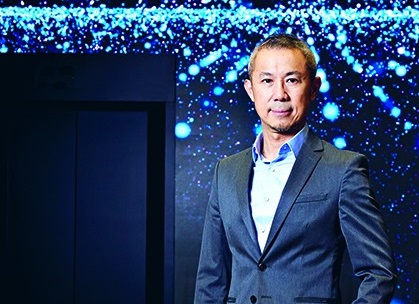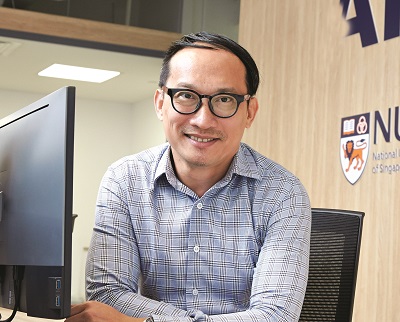Saying “Aye” to AI
The Singapore government certainly believes in the potential of artificial intelligence (AI). Last year, it announced that the National Research Foundation (NRF) would be investing up to $150 million into AI Singapore, a national programme to address challenges that affect both society and industry; to invest in deep capabilities to catch the next wave of scientific innovation; and to grow AI innovation and adoption in companies. Chief Scientist of AI Singapore, Professor Chen Tsuhan, tells us more.

The next time you are catching a live football game on cable TV, remember to say “thank you” to Professor Chen Tsuhan. Long before he became the Deputy President (Research and Technology) of NUS, he worked at research institute AT&T Bell Labs in the US. There, he filed a patent that makes streaming digital video possible. It is just one of the 29 US patents that Prof Chen has to his name.
Today, Prof Chen has his sights set on even more important things. On top of his NUS appointment, he is also the Chief Scientist of AI Singapore (AISG), a national programme in artificial intelligence (AI) hosted at NUS. AI is a field of computer science that involves training machines to function in an intelligent manner; that is, to learn and solve problems. When Siri tells you what the weather is like, or when Google automatically translates text from one language to another, AI is involved. And it is not just found in consumer applications. Earlier this year, the Genome Institute of Singapore used AI to identify cancer-associated mutation hotspots from the analysis of genomes of 212 gastric cancer tumours. Standard techniques would have taken 30 years. AI is also being used to detect illegal network intrusions as well as by financial institutions trying to detect fraudulent transactions. There are hopes that AI can be used in fields like medicine, to help doctors to diagnose a problem or propose a treatment plan.
Big names like Google, Facebook and Apple are investing heavily in AI. In addition, countries such as China also see AI as important to their future and are investing accordingly. “It’s almost crazily competitive in terms of financial resources and talent,” says Prof Chen. And despite the presence of so many heavy-hitters, he believes that Singapore can still play in the big leagues. “Singapore has already done things right. Rather than trying to compete on quantity, we are already very competitive in terms of quality.”

We need to know how to tame AI to make it useful...We have to continue that research.
Prof Chen Tsuhan
GETTING WITH THE PROGRAMME
According to Prof Chen, Singapore leads the world in terms of AI citation impact. This is a measure that looks at the number of citations a paper receives, weighted by field. Machine learning, in particular, is an area where Singapore researchers are doing well, specifically, the sub-field of speech recognition and natural language processing. This is partly because they have to deal with a challenging language environment in Singapore. Here, you have people using multiple languages in the same sentence and even when everyone is speaking the same language, there is a multitude of accents. Add to this the idiosyncrasies of Singlish grammar and you can see why Alexa and Siri would struggle with processing language in Singapore. “We already have researchers, funded by AI Singapore, who are attacking that problem,” he says. “We are in the process of designing an Alexa for Singaporeans, and our professors are leading the world in that area of natural language processing.”
Being able to process multi-language speech would be useful, not just in Singapore, but in other places where multiple languages or dialects are spoken such as in China, India or the Middle East. He says it is his hope that one day, all the core algorithms for natural language processing systems will originate from Singapore. That is not far-fetched, he believes. “If a speech recognition system works in Singapore, I’m pretty sure it will work everywhere else.”
According to Prof Chen, while AISG will try to be as inclusive as possible in terms of supporting AI research that scientists are doing, in terms of areas where they are giving out grants, the organisation is focused on healthcare, finance and urban solutions. “These are the three domains that we believe AI will make a strong impact in Singapore,” he explains.
PLAYING WITH FIRE?
Although there is huge interest in AI, some people are cautious. One concern is that one type of AI, artificial neural networks, is able to learn and make decisions — but this learning takes place in a ‘black box’ that no one understands. Imagine an artificial neural network-powered system tasked with making recommendations about treating a patient with colon cancer. The system has been fed with massive amounts of data from around the world regarding treatment options and outcomes, and it examines all the different variables involved. It then generates a recommended treatment plan based on its understanding of what works best for that particular patient. However, doctors can only see the plan. The decision-making process is a ‘black box’, so doctors cannot judge if the plan makes sense or not.
One more concern that has been raised by some people is the possibility that AI becomes super-intelligent and goes out of control. While such fears are linked more to the unregulated use of poorly-understood technologies, Prof Chen is quick to point out that even in the field of artificial neural networks, some concerns do exist. “Yes, people should be worried about ‘black boxes’, ” he says. “That’s why at AI Singapore, we have one effort known as explainable AI. You want AI algorithms to work, but you also want to be able to explain how they work, so that if they do fail, you understand why, so you can make them better.”
He feels the solution to address all these concerns is actually not to avoid them. “In fact, it’s the opposite. We have to continue that research. “Humans discovered the use of fire, but it took a lot of failures for us to learn how to make fire useful. And then we had to invent fire extinguishers as well. That’s where we are with AI. We need to know how to tame AI to make it useful. And if necessary, we have to come up with an extinguisher!”
HAILING INNOVATION
Grab books a ride with NUS to use AI

Prof Ng See Kiong, Co-Director of the Grab-NUS AI Lab and Director (Translational Research) at the NUS Institute of Data Science
Ride-hailing and payment services company Grab has partnered NUS to set up a $6 million artificial intelligence (AI) lab to develop transport solutions. The Grab-NUS AI Laboratory is Grab’s first major AI laboratory and NUS’ first AI laboratory with a commercial partner. It was launched in July this year.
Professor Ng See Kiong, Co-Director of the Grab-NUS AI Lab and Director (Translational Research) at the NUS Institute of Data Science, says the laboratory’s ultimate aim is to reduce the time people spend on the road getting from A to B. The entire process involves multiple steps which can be improved. For example, Grab wants to assign a ride to the driver who is most likely to accept the job, and AI can be used to better understand a driver’s preferences. The driver also needs to find the person who booked the ride, which is not always easy, as the mapping is sometimes inaccurate or the pick-up point is too generic. Finally, AI can also be used to help the driver leverage on real-time traffic data to find the fastest route.
This collaboration gives NUS researchers access to Grab’s massive dataset, which is a necessary resource for AI research. Grab also presents an interesting case study because in Southeast Asia they use both cars and motorcycles for taxis. “This presents a dataset that
few people have studied,” says Prof Ng. Apart from helping Grab, the work can also help cities deal with traffic congestion and conduct urban planning, he says.
The Grab-NUS AI Lab is located in the innovation 4.0 (i4.0) building, situated in the NUS Kent Ridge campus. i4.0 is home to NUS’ Smart Nation Research Cluster, which comprises 12 research entities specialising in AI, data science, analytics and optimisation, as well as cybersecurity.